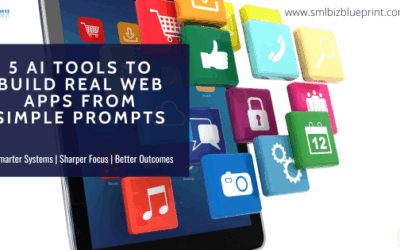In today’s rapidly changing world, small business owners face a number of challenges and opportunities.
From the increase of remote work and the importance of cybersecurity to the growing significance of digitalization and e-commerce, staying on top of the latest trends is crucial for success.
In this blog post, we’ll examine seven key trends that small business owners need to be aware of.

We’ll examine the impact of remote work and the implications for business owners, why cybersecurity needs to be an important focus for any business in an era of increasing cyber threats, and the opportunities presented by digitalization and e-commerce.
We’ll examine the rise of mobile devices and the growing significance of social media.
We will look at the power of data and why understanding and analysing your data is important for every business in making informed business decisions.
Let’s look at all these 7 trends:
#1 Digitalization
Digitalization refers to the process of using digital technologies to improve business operations, reach new customers and create new business models.
With the growing importance of digital technologies, small businesses need to be aware of how they can use these technologies to improve their operations and reach new customers.
It involves the integration of digital technologies such as the Internet, mobile devices, and cloud computing into all aspects of their business.
This can include automating processes, using data analytics to make better decisions, and leveraging digital channels to reach new customers.
Digitalization can also enable small businesses to create new products and services, such as digital goods or online platforms, and to enter new markets through e-commerce.
Additionally, it can enable small businesses to optimize their operations and reduce costs by automating processes, improving communication and collaboration and increasing the efficiency of their operations.
Digitalization is an ongoing process, as new technologies and digital trends continue to emerge, small business owners need to keep themselves informed and adapt to these changes in order to stay competitive.

#2 E-commerce
Online sales are becoming increasingly important for small businesses and this trend is likely to continue.
The increase in e-commerce means more competition for every business, especially small businesses. Now it is easy for anyone to set up a store and start to sell products or services that were the domain of small business owners.
Not only can big businesses easily enter a new market or industry but the rise of what people call “side hustles” can impact a small business. The ability for people to set up stores on Etsy, eBay, and Craigslist creates more competition.
Small businesses need to be aware of how they can use e-commerce platforms to sell their products and services and to protect their business.
E-commerce has the following advantages and opportunities:
- Increased reach: E-commerce allows small businesses to reach customers across a wider geographical area, breaking down physical barriers to reach new customers.
- 24/7 accessibility: E-commerce allows customers to purchase products or services at any time, providing a level of convenience and accessibility that can increase sales.
- Reduced overheads: E-commerce can reduce overhead costs associated with physical stores, such as rent, utilities, and staffing.
- Data collection and analysis: E-commerce platforms provide valuable customer data, which can be used to analyze customer behaviour and preferences to inform marketing and product development decisions.
- Increased flexibility: E-commerce allows small businesses to quickly and easily add or remove products and adjust prices, making it more agile and responsive to customer needs.
- Improved customer experience: E-commerce provides a seamless and convenient shopping experience for customers, with features such as product reviews, personalized recommendations, and easy checkout.
- Global expansion: E-commerce provides the opportunity for small businesses to expand into new international markets without the overhead costs associated with physical stores.
- Reduced friction in the sales process: E-commerce can remove friction from the sales process by providing customers with easy access to information about products, pricing, and shipping, leading to increased sales and customer satisfaction.
- Competitive advantage: By embracing e-commerce, small businesses can gain a competitive advantage over their competitors who have not yet adopted online sales channels.
- Revenue diversification: E-commerce provides small businesses with an additional sales channel, diversifying their revenue streams and reducing their dependence on any one sales channel.
#3 Mobile Optimization
With the growing use of mobile devices, small businesses need to be aware of how they can optimize their website and online presence for mobile users.
With the increasing use of mobile devices, mobile optimization allows small businesses to reach a larger audience.
By providing users with a site that is optimized for the smaller screens of mobile devices, making it easier to navigate and use you are providing a better user experience.
A mobile-optimized site can improve user engagement by providing faster page load times, reducing bounce rates and increasing the time spent on site.
Small businesses that have optimized their sites for mobile devices can gain a competitive advantage over those that have not, as users are more likely to engage with and purchase from mobile-optimized sites.

#4 Social Media
Social media platforms have become an essential tool for small businesses to reach and engage with customers.
Small business owners need to be aware of how to use social media effectively for marketing and customer engagement.
It provides small businesses with a platform to address customer concerns, provide support, and respond to feedback in real-time.
Small businesses that have a strong social media presence can gain a competitive advantage over those that do not, by building brand awareness and increasing customer engagement.
Social media provides small businesses with valuable customer insights, such as customer feedback and preferences, which can inform marketing and product development decisions.
It is important that small businesses use the power of social media for customer service, implement social listening to understand the market and feedback and keep their brand relevant and top of mind with their customers.
#5 Data Analytics
There is so much data available today, so it is important that small businesses are aware of how to collect, analyze and use their data to make better decisions and improve their performance.
By using and understanding their data small business owners are able to:
Gain valuable insights into their operations, helping them make informed decisions about their business.
Identify areas for improvement and increase efficiency, leading to cost savings and increased profitability.
Allows business owners to understand their customers better, including their preferences, behaviours, and pain points.
Create more effective marketing campaigns, reach their target audience more effectively, and increase conversions.
Gain real-time insights into their operations, helping them make informed decisions about their business, improve their allocation of resources and identify potential risks to their business.
Competitive advantage: By using data analytics, business owners can gain a competitive advantage over their rivals by making data-driven decisions.
#6 Cybersecurity
As more and more business is conducted online, small business owners need to be aware of the potential risks to their business from cyber threats and how they can protect themselves.
Protection of sensitive business and customer data is important and something that every business needs to take seriously.
Small businesses need to store and process large amounts of confidential information, such as financial records, customer information, and trade secrets, which are vulnerable to cyber-attacks. It is important to protect such data.
Cyber attacks can result in the theft of funds or sensitive information, or result in costly downtime and disruption to business operations.
A data breach can severely damage a small business’s reputation, making it difficult to attract and retain customers.
Small businesses often have valuable intellectual property, such as proprietary software or confidential business processes, which must be protected from theft or unauthorized access.
In the event of a cyber attack, it is important to have a disaster recovery plan in place to minimize downtime and ensure the continued operation of the business.
Implementing cyber security measures can help minimize the risk of a successful cyber attack, and provide peace of mind for both the business owner and their customers.
Being proactive with cyber security will ensure a business is prepared for any cyber security attack or any regulations that government bodies may implement.

#7 Remote Work
With the pandemic and the shift to remote work, small businesses need to be aware of how to manage and support remote employees and how to adapt their business to this new reality.
Remote work always feels like a two-edged sword.
It gives the following benefits:
Access to a wider talent pool: Remote work allows small businesses to access a wider pool of talent, including skilled professionals who may not be located in the same geographic area as the business.
Increased productivity: Studies have shown that remote workers are often more productive than those who work in traditional office settings.
Cost savings: Remote work can help small businesses save on overhead costs associated with physical offices, such as rent, utilities, and maintenance.
Flexible work arrangements: Remote work allows small businesses to offer more flexible work arrangements, such as part-time or freelance work, leading to increased employee satisfaction and retention.
Improved work-life balance: Remote work can provide employees with a better work-life balance, leading to increased job satisfaction and better mental health.
Environmental benefits: Remote work can reduce the environmental impact associated with daily commuting, reducing carbon emissions and contributing to a more sustainable future.
Access to a 24/7 workforce: Remote work allows small businesses to access a workforce that can work around the clock, leading to increased productivity and faster project completion times.
Improved employee retention: Remote work can lead to improved employee retention, as employees value the flexibility and work-life balance that comes with remote work.
Adaptable to changing circumstances: Remote work provides small businesses with the flexibility to adapt to changing circumstances, such as pandemics or natural disasters, without disrupting business operations.
But it does also give the following issues:
Communication challenges: When employees are working remotely, it can be more difficult to maintain effective communication and collaboration. This can result in misunderstandings, delays, and a lack of alignment between team members.
Technological barriers: Remote work relies heavily on technology, and small businesses may not have the resources or infrastructure to support a fully remote workforce. This can lead to technical issues, security concerns, and increased costs.
Management and supervision: Supervising and managing remote employees can be challenging, particularly if managers are not familiar with remote work practices or lack the tools and resources to effectively manage a remote team.
Maintaining company culture: Remote work can make it more difficult to maintain a strong company culture and sense of community. It can be harder to build relationships, establish trust, and create a shared sense of purpose and identity when employees are not physically together.
Employee isolation and burnout: Remote work can lead to feelings of isolation and disconnection, particularly for employees who are used to working in a team environment.
Each of these 7 trends provides its own challenges and opportunities for a business. So how does a small business owner respond?
This will depend on the strategic objective of the business, the quality and skills of their staff and their customers and the relationship they have with them.




